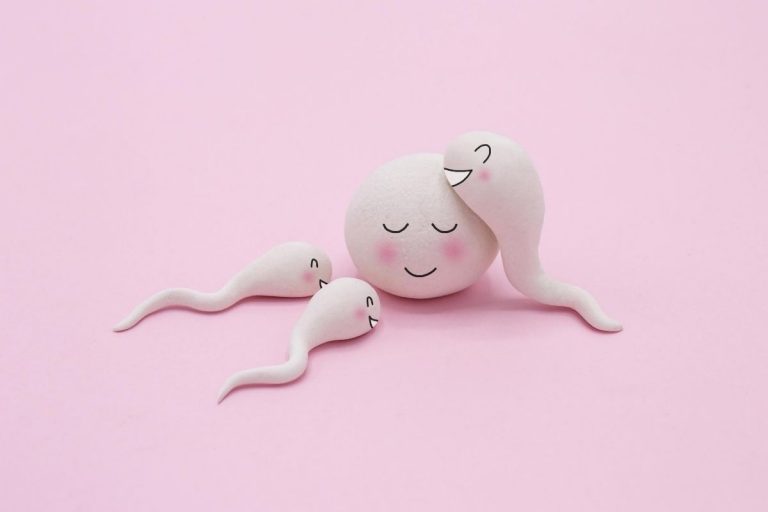In association with professional midwife experts at birthEd, find out everything you need to know about pregnancy at 2 weeks, including how your baby is growing, changes to expect in your body and pregnancy health, nutrition and wellness advice.
| Week 1 |
Week 3 |
2 Weeks Pregnant – Your baby, your body & you
Your Baby
Women generally ovulate between the 14-16th day of their menstrual cycle and fertilisation is more likely to occur when we have sex just before ovulation.
Sperm need to go through a process that prepares them to be able to fertilise an egg and this can take a couple of hours or more. In fact the semen forms a pool in the seminal wall (below the cervix) for up to 5 days after entering your vagina. This may be nature’s way of making sure that only the fittest and healthiest sperm make it to the egg to fertilise it.
Fun Facts
- An egg lives for approximately 12-24 hours after leaving the ovary.
- Approximately 200 million sperm in about approximately 3ml of semen enter the vagina on ejaculation and within a minute some sperm have made it through the cervix and into the uterus! Most sperm however don’t ever make it past the cervix.
- The lucky sperm that make it to the cervix are nourished by the cervical mucus and can survive for hours and up to 5 days!
- It has actually been detected that your egg attracts or repels sperm with a negative or positive charge and this has been photographed.
Conception does not actually occur until one or maybe two sperm (in the case of non-identical twins – two eggs meet two sperm) have merged together to form the zygote – a one-celled combination of the egg and sperm.
As yet you are not yet technically pregnant! .. hang in there – it’s about to happen!
Common Signs of Ovulation
- A change in your basal body temperature (BBT). Your BBT reaches its lower point as you ovulate and then rises half a degree. You are most fertile during the two to three days before your BBT rises once ovulation has occurred and by tracking your BBT you may be able to predict when you ovulate. It is recommended that you take your temperature before getting out of bed each morning. (NB: Your BBT can be influenced by other factors including stress, illness, an interrupted sleep cycle, alcohol, some medications, travel and time differences and some gynecological conditions)
- A change in cervical mucus (refer to week 1)
- Breast tenderness
- Abdominal pain. Some women have a symptom referred to as Mittelchmerz, which is when a slight discomfort or pain is felt when an egg is released
- Light spotting. Some women may experience an ovulatory bleed caused by the egg rupturing the follicle
- An increase in libido or your sex drive
Does female orgasm increase your odds of making a baby?
There are two main theories on whether a woman’s orgasm can increase her odds in becoming pregnant.
The ‘poleaxe’ hypothesis states that the purpose of having an orgasm is to relax the woman and make her feel sleepy so that she will want to lie down after sex. The ‘upsuck’ theory is a hypothesis that the contractions caused by an orgasm makes the cervix contract into the vagina and ‘suck up’ the semen. This mechanism is believed to help propel the sperm into the uterus and towards the fallopian tube to find the egg.
Unfortunately there isn’t a study that ties female orgasm to conception. What some studies have shown though, is that the longer time is spent on foreplay and the more sexually aroused a man is before ejaculation, the greater his sperm count.
Increased estrogen levels in the days leading up to ovulation will also increase the cervical mucus and make it more likely for a woman to orgasm.
Research has also shown that female orgasms can be felt more intensely during ovulation and in pregnancy, which is in response to the increased blood supply to the pelvic region.
Orgasm may or may not help you get pregnant but it will certainly add to the fun and satisfaction in making a baby. Oxytocin is the love hormone and our brain releases it during an orgasm which counters the effects of cortisone (the stress hormone), and leaves us feeling relaxed, connected, loving and ready for sleep.
However it’s important to take the pressure and emphasis off making a baby and having an orgasm and just focus on enjoying each other!
Your Body
Preconception Health (PCH) is your health before you become pregnant and encompasses being healthy and living well and is a precious gift to your baby. It matters, and it can have an effect on the development and health of your baby.
Preparing for Baby
Alcohol is a teratogen – a substance that may affect the development of the fetus.
Fetal alcohol spectrum disorders (FASD) refers to a spectrum of disorders in a child that is a result of being exposed to alcohol in pregnancy. The teratogenic effects of alcohol can occur during all stages of pregnancy, however it can cause serious damage to your growing embryo during the first three weeks after conception.
When the developing embryo is exposed to alcohol between the 4th and 9th week, brain damage and birth defects can occur. Alcohol crosses from the mother’s bloodstream to the baby’s in the same concentration and can cause miscarriage and stillbirth or prematurity, low birth weight and growth restriction, developmental delay and cognitive, social, emotional and behavioural problems. FASD is one of the three leading causes of birth defects.
The Ministry of Health says there is currently not enough evidence to show that low to moderate alcohol consumption does not cause irreversible effects and there is no known safe level of alcohol at any stage of pregnancy. They also advise that women stop drinking alcohol when planning to become pregnant.
- Children with diagnoses included under the umbrella term FASD can have:
- brain damage
- birth defects
- poor growth
- developmental delay
- difficulty hearing
- difficulty sleeping
- problems with vision
- difficulty remembering
- a short attention span
- language and speech deficits
- low IQ
- problems with abstract thinking
- poor judgement
- social and behavioural problems
- difficulty forming and maintaining relationships
- characteristic facial features
You
De-stress! Support yourself during this time by focussing on reducing your stress levels. How is your work space? Are you asking for what you want and need?
If you’re experiencing high levels of stress, or you are exposed to any harmful or hazardous chemicals or perhaps you’re standing for prolonged periods of time, then this is a time where stepping forward and asking for support or a change is really important.
Asking for help or change can be challenging and often takes courage. Ask someone you trust to support you to ask for what you want.
Sleep is one of the best remedies for everything. Supporting yourself to get at least 8 hours sleep every night can bring so many benefits, especially to help in your conception, your relationships and your mental health. These are so important in the lead up to a time of big change.
This week could be a good week to ask yourself what might be stopping you from getting into bed early? What could you bring in or take out of your bedtime routine so that you can get the restorative and deep sleep you are so deserving of?
Your Relationships
Have a scheduled date night each week and take turns organising an activity to do together. Cook your partner a favourite meal, play a game, watch a movie, have a bath together. Did you try the activities in a jar exercise from week 1?
This Week’s Preparation
Track your cycle and body. You could buy a thermometer and an ovulation kit.
Get enough sleep!
Move your body and exercise each day
Check any medications or supplements you are taking with your GP to ensure they are safe to take during pregnancy
Stop smoking, vaping, drinking and using drugs – Call Quitline on 0800 778 778 or visit https://quit.org.nz to find out about these services
Stop drinking alcohol – if you are trying to get pregnant it is highly recommended that you avoid alcohol
Start taking a prenatal vitamin and additional folic acid if there isn’t 800mg in your vitamin
Cut back on your caffeine intake
Increase your consumption of fruit and vegetables and cut back on sugar and fat
Track your menstrual cycle
For him: All of the above and keep your scrotum cool. Heat slows down sperm production and so avoid hot baths, tight pants and wear boxers instead of briefs!
Get your Rubella immunity checked
Back to 52 Weeks of pregnancy.
Research
https://www.whattoexpect.com/pregnancy/week-by-week/weeks-1-and-2.aspx#section-baby
Pham, M.N., Jeffery, A.J., Sela, Y. et al. “Duration of Cunnilingus Predicts Estimated Ejaculate Volume in Humans: a Content Analysis of Pornography.” Evolutionary Psychological Science (2016) 2: 220. doi:10.1007/s40806-016-0057-5
Custers IM, Flierman PA, Maas P, Cox T, Van Dessel TJ, Gerards MH, Mochtar MH, Janssen CA, van der Veen F, Mol BW. “Immobilisation versus immediate mobilisation after intrauterine insemination: randomised controlled trial.” British Medical Journal. 2009 Oct 29; 339:b4080. doi: 10.1136/bmj.b4080.
Levin, Roy J. “The Physiology of Sexual Arousal in the Human Female: A Recreational and Procreational Synthesis.” Archives of Sexual Behavior. Volume 31, Number 5, 405-411.
Ministry of Health. 2010. Alcohol and Pregnancy: A practical guide for health professionals. Wellington: Ministry of Health
Pavličev, Mihaela; Wagner, Gunter. “The Evolutionary Origin of Female Orgasm Authors.” JEZ-Molecular and Developmental Evolution, 2016 DOI: 10.1002/jez.b.22690
Zietsch BP, Santtilac P. “No direct relationship between human female orgasm rate and number of offspring.” Animal Behaviour. Volume 86, Issue 2, August 2013, Pages 253–255.
Mihaela Pavlicev, Andreja Moset Zupan, Amanda Barry, Savannah Walters, Kristin M. Milano. “An experimental test of the ovulatory homolog model of female orgasm”.
https://www.health.govt.nz/system/files/documents/publications/hsac07_fasd_finalv2.pdf
Ministry of Health. 2010. Alcohol and Pregnancy: A practical guide for health professionals. Wellington: Ministry of Health. http://www.moh.govt.nz







